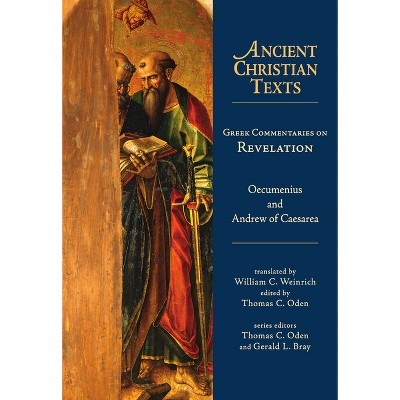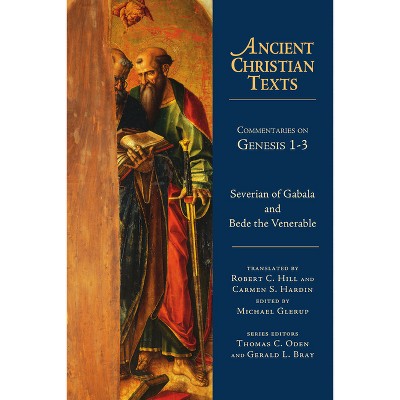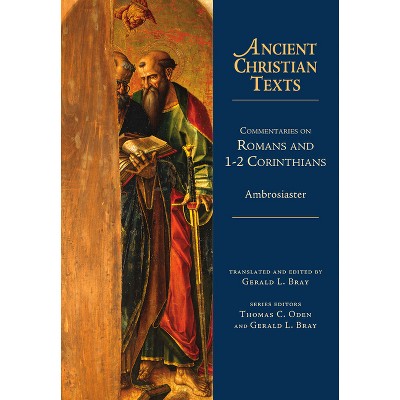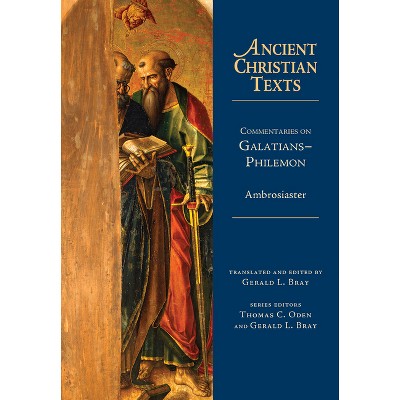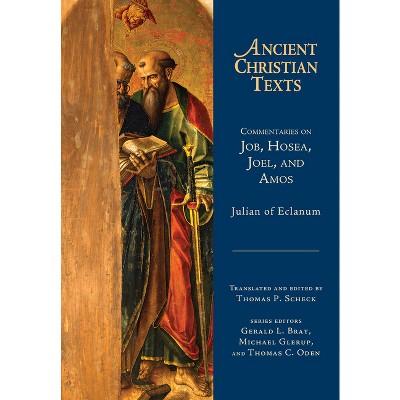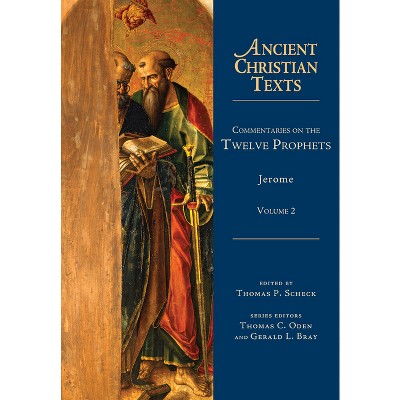Latin Commentaries on Revelation - (Ancient Christian Texts) by Victorinus of Petovium & Apringius of Beja & Caesarius of Arles & Bede (Hardcover)

About this item
Highlights
- Interest in the book of Revelation in the Western tradition is stronger and earlier than that in the East.
- About the Author: Gerald L. Bray (Ph.D., La Sorbonne) is a professor at Beeson Divinity School of Samford University in Birmingham, Alabama, and director of research at Latimer Trust.
- 251 Pages
- Religion + Beliefs, Biblical Commentary
- Series Name: Ancient Christian Texts
Description
About the Book
In this volume of the Ancient Christian Texts series, William Weinrich renders a particular service to readers interested in ancient commentary on the Apocalypse by drawing together significant Latin commentaries from Victorinus of Petovium, Caesarius of Arles, Apringius of Beja and Bede the Venerable.
Book Synopsis
Interest in the book of Revelation in the Western tradition is stronger and earlier than that in the East. The earliest full commentary on the Apocalypse is that of Victorinus of Petovium written in the mid to late third century by the earliest exegete to write in Latin. Victorinus interpreted Revelation in millennialist terms, a mode of interpretation already evident in works by Irenaeus, as well as in modest allegorical terms.
Caesarius of Arles wrote in the early sixth century and offered a thoroughgoing allegorical-ecclesial interpretation of the Apocalypse. Apringius of Beja in Portugal, writing in the mid sixth century, drew on Jerome's edition of Victorinus's commentary yet understood the seven seals christologically as the incarnation, birth, passion, death, resurrection, glory and kingdom.
Bede the Venerable, who died in 735, is the last commentator to be included in this collection. Characteristically, he passes on commentary from earlier exegetes, here including that of Augustine, Gregory the Great, Victorinus, Tyconius and Primasius.
William Weinrich renders a particular service to readers interested in ancient commentary on the Apocalypse by drawing together these significant Latin commentaries. The work of translating these texts was begun in preparing the volume on Revelation in the Ancient Christian Commentary on Scripture. We are indebted to William Weinrich for completing this work with his able and fresh translation and notes on these texts.
Ancient Christian Texts are new English translations of full-length commentaries or sermon series from ancient Christian authors that allow you to study key writings of the early church fathers in a fresh way.
Review Quotes
"This is an excellent contribution to a much-needed series, which, along with Weinrich's companion volume on the Greek commentaries of Oecumenius and Andreas of Caesarea, makes available to a wider readership the diversity and rich sophistication of early exegesis of Revelation. Revelation scholars will profit immensely from the interpretive possibilities explored by their ancient predecessors."
--Ian K. Boxall, Journal for the Study of the New Testament, 35(5)About the Author
Gerald L. Bray (Ph.D., La Sorbonne) is a professor at Beeson Divinity School of Samford University in Birmingham, Alabama, and director of research at Latimer Trust. He has written and edited a number of books on different theological subjects. A priest of the Church of England, Bray has also edited the post-Reformation Anglican canons.
William C. Weinrich (D.Theol., Basel) has served as rector of the Luther Academy, theological seminary of the Evangelical Lutheran Church of Latvia, and professor of early church history and patristic studies at Concordia Theological Seminary in Fort Wayne, Indiana. He edited Revelation in the Ancient Christian Commentary on Scripture.
Thomas C. Oden (1931-2016), was the general editor of the Ancient Christian Commentary on Scripture and the Ancient Christian Doctrine series as well as the author of Classic Christianity, a revision of his three-volume systematic theology. He was the director of the Center for Early African Christianity at Eastern University in Pennsylvania and he served as the Henry Anson Buttz Professor of Theology at The Theological School of Drew University in Madison, New Jersey. Oden was active in the Confessing Movement in America, particularly within the United Methodist Church and was president of The Institute for Classical Christian Studies. He suggested that Christians need to rely upon the wisdom of the historical Church, particularly the early Church, rather than on modern scholarship and theology and said his mission was "to begin to prepare the postmodern Christian community for its third millennium by returning again to the careful study and respectful following of the central tradition of classical Christianity."
Shipping details
Return details
Trending Poetry






